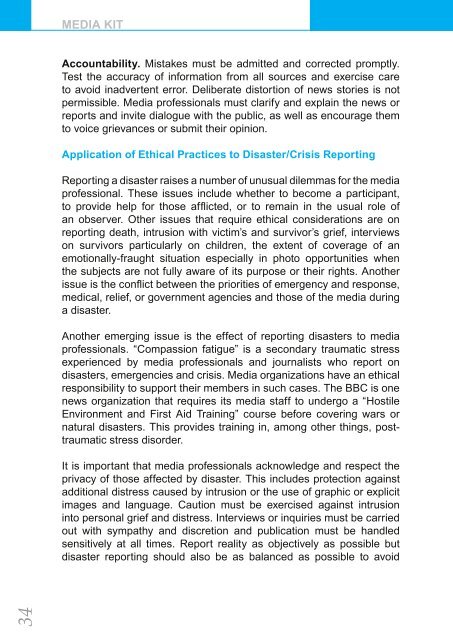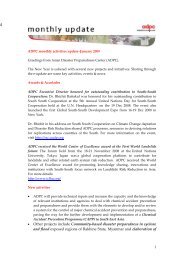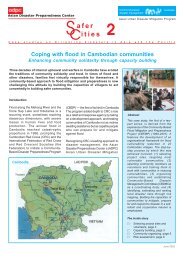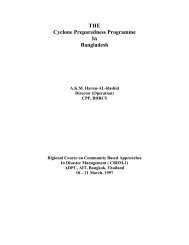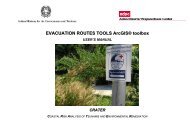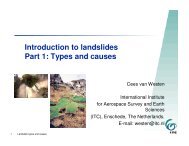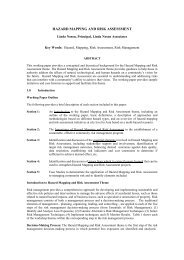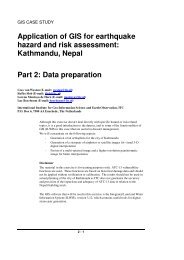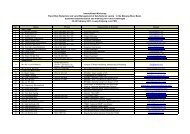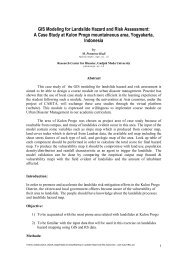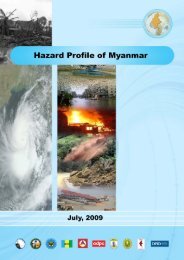community-based disaster risk management and the media media kit
community-based disaster risk management and the media media kit
community-based disaster risk management and the media media kit
You also want an ePaper? Increase the reach of your titles
YUMPU automatically turns print PDFs into web optimized ePapers that Google loves.
34<br />
MEDIA KIT<br />
Accountability. Mistakes must be admitted <strong>and</strong> corrected promptly.<br />
Test <strong>the</strong> accuracy of information from all sources <strong>and</strong> exercise care<br />
to avoid inadvertent error. Deliberate distortion of news stories is not<br />
permissible. Media professionals must clarify <strong>and</strong> explain <strong>the</strong> news or<br />
reports <strong>and</strong> invite dialogue with <strong>the</strong> public, as well as encourage <strong>the</strong>m<br />
to voice grievances or submit <strong>the</strong>ir opinion.<br />
Application of Ethical Practices to Disaster/Crisis Reporting<br />
Reporting a <strong>disaster</strong> raises a number of unusual dilemmas for <strong>the</strong> <strong>media</strong><br />
professional. These issues include whe<strong>the</strong>r to become a participant,<br />
to provide help for those affl icted, or to remain in <strong>the</strong> usual role of<br />
an observer. O<strong>the</strong>r issues that require ethical considerations are on<br />
reporting death, intrusion with victim’s <strong>and</strong> survivor’s grief, interviews<br />
on survivors particularly on children, <strong>the</strong> extent of coverage of an<br />
emotionally-fraught situation especially in photo opportunities when<br />
<strong>the</strong> subjects are not fully aware of its purpose or <strong>the</strong>ir rights. Ano<strong>the</strong>r<br />
issue is <strong>the</strong> confl ict between <strong>the</strong> priorities of emergency <strong>and</strong> response,<br />
medical, relief, or government agencies <strong>and</strong> those of <strong>the</strong> <strong>media</strong> during<br />
a <strong>disaster</strong>.<br />
Ano<strong>the</strong>r emerging issue is <strong>the</strong> effect of reporting <strong>disaster</strong>s to <strong>media</strong><br />
professionals. “Compassion fatigue” is a secondary traumatic stress<br />
experienced by <strong>media</strong> professionals <strong>and</strong> journalists who report on<br />
<strong>disaster</strong>s, emergencies <strong>and</strong> crisis. Media organizations have an ethical<br />
responsibility to support <strong>the</strong>ir members in such cases. The BBC is one<br />
news organization that requires its <strong>media</strong> staff to undergo a “Hostile<br />
Environment <strong>and</strong> First Aid Training” course before covering wars or<br />
natural <strong>disaster</strong>s. This provides training in, among o<strong>the</strong>r things, posttraumatic<br />
stress disorder.<br />
It is important that <strong>media</strong> professionals acknowledge <strong>and</strong> respect <strong>the</strong><br />
privacy of those affected by <strong>disaster</strong>. This includes protection against<br />
additional distress caused by intrusion or <strong>the</strong> use of graphic or explicit<br />
images <strong>and</strong> language. Caution must be exercised against intrusion<br />
into personal grief <strong>and</strong> distress. Interviews or inquiries must be carried<br />
out with sympathy <strong>and</strong> discretion <strong>and</strong> publication must be h<strong>and</strong>led<br />
sensitively at all times. Report reality as objectively as possible but<br />
<strong>disaster</strong> reporting should also be as balanced as possible to avoid


